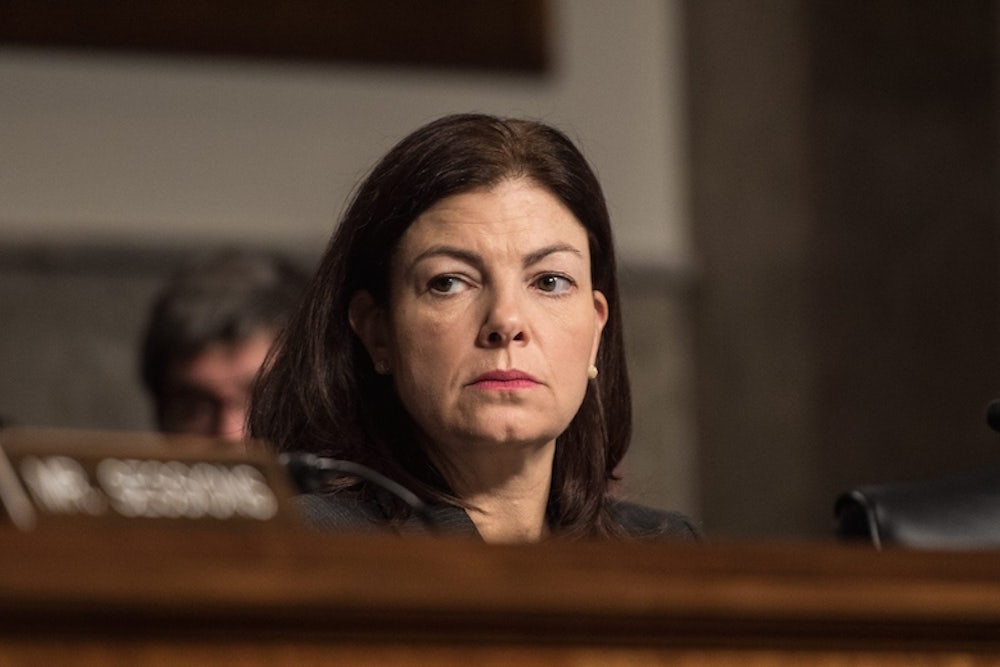Gun violence “is something we should politicize,” President Barack Obama insisted in emotional, frustrated remarks on Thursday after a mass shooting at Umpqua Community College in Roseburg, Oregon left ten people dead.
Obama’s speech charged politicians to lead with gun control legislation, but he left out the more obvious point: Congress’s makeup needs to change if there’s any hope of ever passing the most basic of gun control legislation, universal background checks. This starts with targeting vulnerable pro-gun politicians and replacing them with Democrats or Republicans who better represent public opinion.
And no one is more vulnerable than Senator Kelly Ayotte of New Hampshire, who faces reelection in a presidential swing state in 2016.
Ayotte is an incumbent of an unpopular Congress in a blue-leaning state. No matter what, she'd already face an uphill climb during a presidential year, when turnout is generally better for Democrats. But it's her record on gun violence that could tip the scale in favor of Democrats.
After the Newtown, Conneticut shooting in late 2012, Ayotte was considered a possible GOP vote in favor of the Toomey-Manchin amendment to strengthen background checks. In the end, only four Republicans broke with their party to vote for the bill, leaving it to fail 54-46 in the Senate. Ayotte was one of the votes against it. For weeks after her vote, Ayotte faced tough questions at town halls over her vote, including one memorable encounter with the daughter of a Newtown victim. "You had mentioned that the burden to owners of gun stores that these expanded background checks would cause," the daughter Erica Lafferty said. "I'm just wondering why the burden of my mother being gunned down in the hall of her elementary school isn't as important as that?" Ayotte's poll numbers fell. According to an April 2013 survey by the left-leaning Public Policy Polling, before the vote, 48 percent of New Hampshire voters approved of the job she was doing, while 35 percent disapproved. After the vote, she went underwater, with 44 percent approving while 46 percent disapproved. Since then, she's recovered her poll numbers.
Ayotte won’t be the only Republican facing scrutiny for a pro-gun record. Other vulnerable politicians are in a similar position—in 2016, more Republicans are running in moderate swing states. Senator Ron Johnson of Wisconsin and Senator Rob Portman of Ohio also voted against background checks in 2013, face competitive Democratic challengers, and received intense scrutiny for their votes.
Now, none of this is a guarantee that gun control will remain a top concern 13 months from now, but there are some encouraging signs that 2016 might be a key moment for the gun violence movement, despite the political power of the National Rifle Association.
For one thing, they have deep-pocketed groups on their side: Independence PAC, Everytown for Gun Safety, and Mayors Against Illegal Guns, backed by Michael Bloomberg. These groups saw some unexpected, if spotty successes in the 2014 cycle, which otherwise went poorly for Democrats overall. Colorado ousted the pro-gun Republicans who had replaced legislators recalled over passing gun control and Washington state passed a ballot measure to expand background checks.
Admittedly, there aren't many examples of Democrats winning a seat from Republicans based on gun control alone. But it could motivate voters, particularly in states that have dealt with high-profile shootings of late. And Virginia might prove to be a model for 2016. Every seat in the Virginia General Assembly is up for election in 2015, and the narrowly Republican-controled legislature voted down background checks, while sending pro-gun bills to the Democratic governor (who vetoed). Republicans are expected to hold on to a majority, but since two Virginia journalists were slain on camera in August, guns have reemerged as an issue in the state. According to a late September poll from the Wason Center for Public Policy at Christopher Newport University, 14 percent of Virginia voters say reducing gun violence should be the top priority of state legislators, behind concerns over public schools and federal spending but above issues like health care and traffic.
As Virginia could show, it sometimes takes a tragedy to change the politics around gun violence. The changing politics around guns might mean bad news for Ayotte, too.
Update: On Monday, Ayotte gained a formidable challenger for the Senate seat. New Hampshire Governor Maggie Hassan announced she'll challenge Ayotte in 2016.
This article has been updated.
